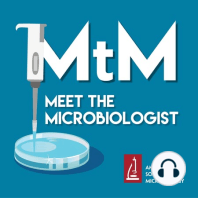24 min listen
MTS4 David Relman - The Human Microbiome
ratings:
Length:
31 minutes
Released:
Sep 25, 2008
Format:
Podcast episode
Description
David Relman is a Professor of Medicine and of Microbiology & Immunology at Stanford University, and his research program focuses on the human microbiome – the microbial communities of bacteria, viruses, and other organisms that thrive on and in the human body. He’ll be speaking at ASM’s conference on Beneficial Microbes in San Diego this October, where he’ll talk about our personal microbial ecosystems, how far we’ve come in research and how far we have to go.
Since Louis Pasteur first deduced that microbes are to blame for infectious disease, doctors and scientists alike have mostly seen infection as warfare between a pathogen and the human body. Dr. Relman sees things a little differently. To him, the complex communities of microbes that line our skin, mouths, intestines, and other orifices (ahem) are also involved in this battle, interacting with pathogens and with our bodies, and these interactions help determine how a fracas plays out.
In this interview, I asked Dr. Relman about our personal ecosystems of microbes, whether we’ll ever be able to understand and predict what these communities do, and about the sometimes distressing effects of oral antibiotics on our guts. We also talked about whether being MTV’s Rock Doctor back in the 1990’s had an impact on his other professional pursuits.
Since Louis Pasteur first deduced that microbes are to blame for infectious disease, doctors and scientists alike have mostly seen infection as warfare between a pathogen and the human body. Dr. Relman sees things a little differently. To him, the complex communities of microbes that line our skin, mouths, intestines, and other orifices (ahem) are also involved in this battle, interacting with pathogens and with our bodies, and these interactions help determine how a fracas plays out.
In this interview, I asked Dr. Relman about our personal ecosystems of microbes, whether we’ll ever be able to understand and predict what these communities do, and about the sometimes distressing effects of oral antibiotics on our guts. We also talked about whether being MTV’s Rock Doctor back in the 1990’s had an impact on his other professional pursuits.
Released:
Sep 25, 2008
Format:
Podcast episode
Titles in the series (100)
MTS6 Bruce Rittmann - Microbes, Waste and Renewable Energy by Meet the Microbiologist
